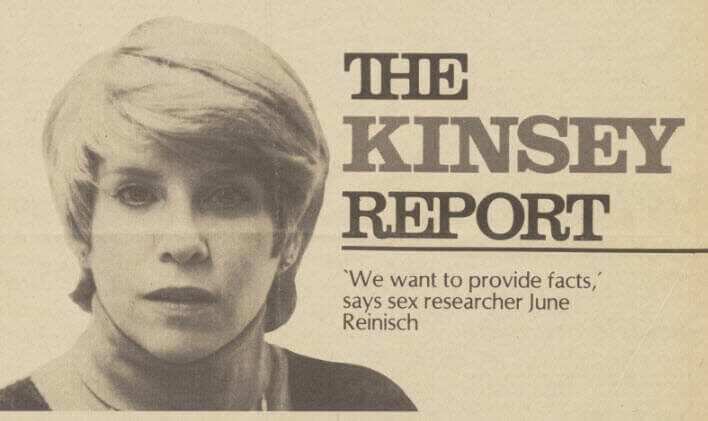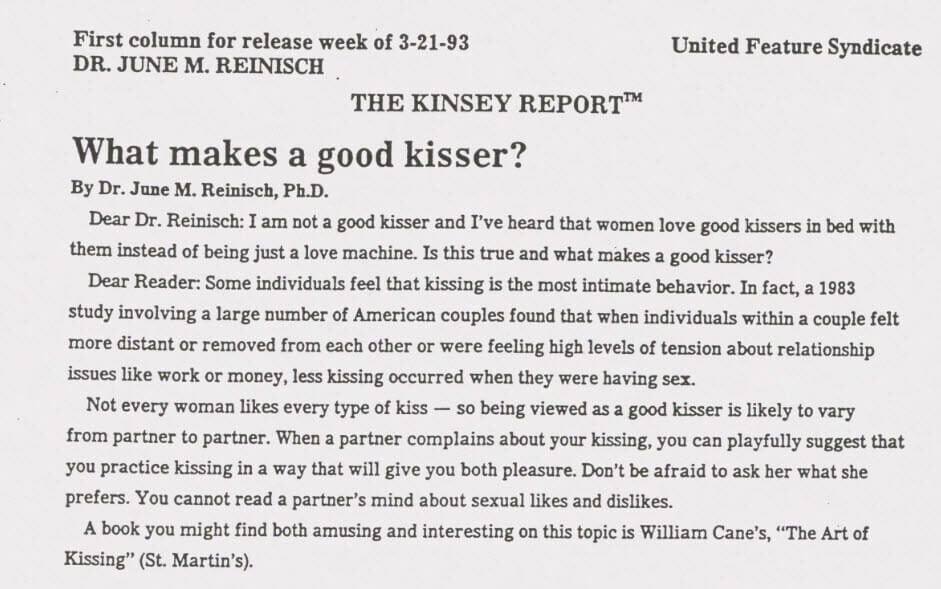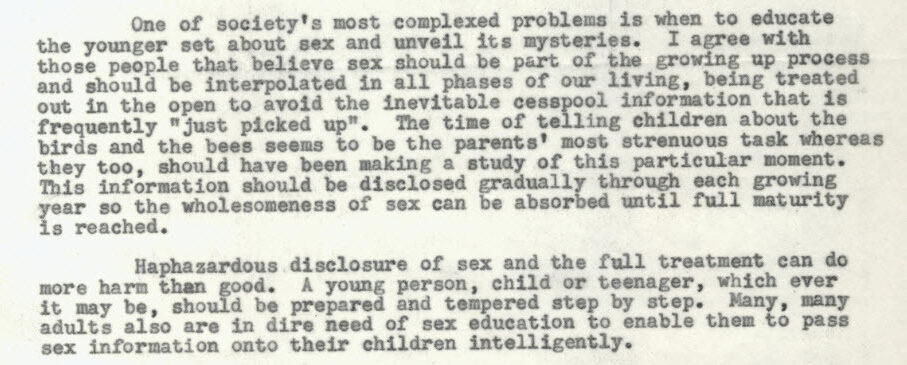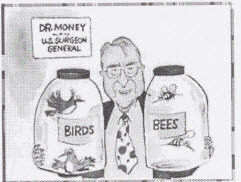Beyond the Birds and the Bees: A reflection on AM’s Sex & Sexuality resource
“At no times in our lives were we ever taught anything about sex beyond the birds and the bees” is one of the first lines I recall reading when embarking upon AM’s latest project, Sex & Sexuality. Written by an anonymised “Mount Carmel Man” in 1984, this statement captures, for me at least, the utter indignation and frustration expressed by so many subjects within this resource, who perceived their sex education to have not only been lacking, but totally inadequate for later life.
Whilst the scarcity of accurate sex education throughout America had been acknowledged repeatedly across prior research projects led under Dr’s Kinsey and Gebhard, it was not until Dr June Reinisch’s tenure that the Kinsey Institute for Research in Sex, Gender and Reproduction attempted to tackle this in any tangible sense. Under Reinisch’s directorship, the Institute sought out various means of advancing the public's general knowledge of human sexual activity and The Kinsey Report played a fundamental role in achieving this.

[Newspaper articles advertising The Kinsey Report], 1983-1984, © Copyright 2017, The Trustees of Indiana University on behalf of the Kinsey Institute. All rights reserved.
Begun by Reinisch in 1984, The Kinsey Report was the first syndicated newspaper column to tackle questions relating to all facets of sex, sexuality and reproduction. Promising to share advice and information without taking a “philosophical, moral or ethical stand”, the Kinsey Report sparked an unprecedented amount of attention and instantly received a flood of questions from an anxious and intrigued populous. What astounded me, on first encountering many of the submissions, was the sheer variety of their focus, and the extent of misinformation that was circulating during this time.
Submitted queries ran the gamut from innocent intrigue to more pressing concerns; one writer asked, “What makes a good kisser?” while another enquired, “Can I become pregnant through heavy petting?”

Love & Affection, 12 Feb 1984 - 21 Mar 1993, © Copyright 2017, The Trustees of Indiana University on behalf of the Kinsey Institute. All rights reserved.
No question was too big or small, niche or broad, for Reinisch to answer. Replying to letters multiple times a week, Reinisch provided information as opposed to answers, often quoting relevant research or reading materials for the subjects to consult privately. This column marked a significant moment in the history of sexology on two scores: not only did it provide the public with an anonymized, and therefore protected, means of gaining information about sexual health, language, taboos and behaviours, but it also gave researchers a clearer picture of wider public concerns and the glaring need for better sex education across America.
Reinisch has continued to drive agendas to improve sex education across America, publishing works such as “The Kinsey Institute New Report on Sex: What You Must Know to be Sexually Literature” in 1990, dedicated to the cause, and encouraging open, frank discussions around sex. Further letters, written by numerous Sexologists communicating with the Institute reveal the reach and impact of Reinisch’s work. For instance, in another letter of 1954, support is pledged to, ”those people that believe sex should be part of the growing up process and should be interpolated in all phases of our living”, and recognises that...”Many, many adults are in dire need of sex education to enable them to pass sex information on to their children intelligently”.

[Letters covering a number of topics including que..., 29 Apr 1953 - 8 Jan 1954, © Copyright 2017, The Trustees of Indiana University on behalf of the Kinsey Institute. Some material also sourced from the Collections of the Kinsey Institute, Indiana University. All rights reserved.
In a world where Love Island shenanigans and “celebrity” sex exposés dominate headlines, and where “Netflix and Chill” requires no explanation, it’s difficult to imagine that the “Birds and the Bees” conversation continues to stand the test of time. As much of the material in Sex & Sexuality exposes, this analogy has historically fallen short in disseminating sufficient sex information and more work and research is undoubtably needed if we aspire to provide sex education fit for the 21st century. By making available a wealth of primary material collated by some of the leading American sexologists, sex researchers and organizations, Sex & Sexuality offers students and researchers fertile ground for looking beyond the “Birds and the Bees” and furthering the conversation and work Reinisch and her colleagues started more than 35 years ago.

Registries [Folder 2], 1956-2000, © Copyright 2017, The Trustees of Indiana University on behalf of the Kinsey Institute. Some material also sourced from the Collections of the Kinsey Institute, Indiana University. All rights reserved.
For more information about Sex and Sexuality, including booking a demo and price enquiries, please email us at info@amdigital.co.uk.
Recent posts

The blog highlights American Committee on Africa, module II's rich documentation of anti-apartheid activism, focusing on the National Peace Accord, global solidarity, and student-led divestment campaigns. It explores the pivotal role of universities, protests, and public education in pressuring institutions to divest from apartheid, shaping global attitudes toward social justice and reform.

This blog examines how primary sources can be used to trace the impact of young voices on society, particularly during pivotal voting reforms in the UK and the US. Explore materials that reveal insights into youth activism, intergenerational gaps, and societal perceptions, highlighting their interdisciplinary value for studying youth culture, activism, and girlhood across history.
